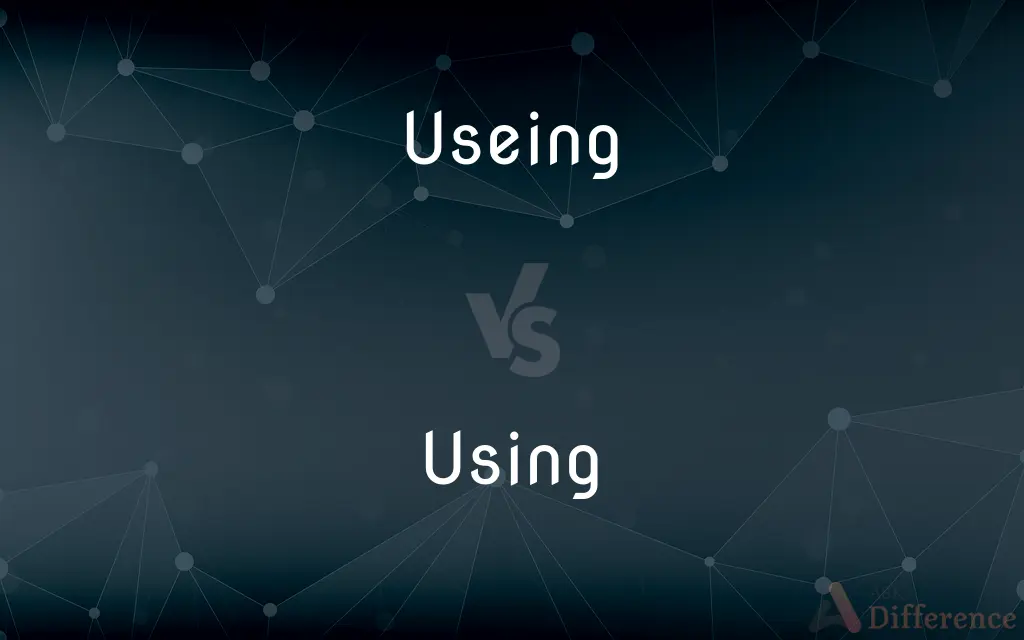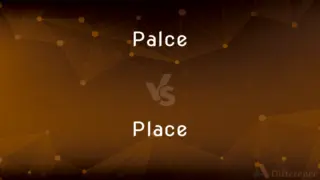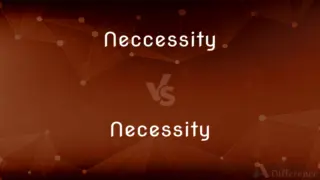Useing vs. Using — Which is Correct Spelling?
By Tayyaba Rehman — Updated on March 21, 2024
"Useing" is an incorrect spelling, while "Using" is correct, denoting the act of utilizing something.

Table of Contents
Which is correct: Useing or Using
How to spell Using?

Useing
Incorrect Spelling

Using
Correct Spelling
ADVERTISEMENT
Key Differences
Recall that most verbs ending in "e" drop the "e" before adding "-ing."
"Use" plus "-ing" equals "Using." No extra "e" needed.
Think of similar verbs, like "make" becoming "making" and not "makeing."
Pronounce "Using" as /ˈjuːzɪŋ/ and notice it sounds natural compared to the incorrect form.
Remember that "using" is like "singing" – simple and straight to the point without extra letters.
ADVERTISEMENT
How Do You Spell Using Correctly?
Incorrect: I was useing the computer when it suddenly crashed.
Correct: I was using the computer when it suddenly crashed.
Incorrect: We were useing the gym's facilities when the power went out.
Correct: We were using the gym's facilities when the power went out.
Incorrect: She has been useing the same shampoo for years.
Correct: She has been using the same shampoo for years.
Incorrect: They keep useing that excuse for every mistake.
Correct: They keep using that excuse for every mistake.
Incorrect: Are you useing the right tool for this job?
Correct: Are you using the right tool for this job?
Using Definitions
"Using" can imply the act of consuming or taking drugs.
He admitted to using illegal substances.
"Using" refers to the act of employing something for a purpose.
She's using the computer.
"Using" signifies the act of applying a method or technique.
He's using a new method to teach math.
"Using" denotes taking advantage of or manipulating someone or something.
He felt like she was using him for his money.
To put into service or employ for a purpose
I used a whisk to beat the eggs. The song uses only three chords.
To avail oneself of; practice
Use caution.
To conduct oneself toward; treat or handle
"the peace offering of a man who once used you unkindly" (Laurence Sterne).
To seek or achieve an end by means of; exploit
Used their highly placed friends to gain access to the president.
Felt he was being used by seekers of favor.
To take or consume for a purpose
She used her savings to buy a computer.
To partake of, especially as a habit
She rarely uses alcohol.
(ys, yst) Used in the past tense followed by to in order to indicate a former state, habitual practice, or custom
Mail service used to be faster.
(Slang) To take an illegal or narcotic drug, especially as a habit.
The act of using something; the application or employment of something for a purpose
With the use of a calculator.
Skilled in the use of the bow and arrow.
The condition or fact of being used
A chair in regular use.
The manner of using; usage
Learned the proper use of power tools.
The permission, privilege, or benefit of using something
Gave us the use of their summerhouse.
The power or ability to use something
Lost the use of one arm.
The need or occasion to use or employ something
I have no use for these old clothes.
The quality of being suitable or adaptable to an end; usefulness
I tried to be of use in the kitchen.
A purpose for which something is used
A tool with several uses.
A pretty bowl, but of what use is it?.
Gain or advantage; good
There's no use in discussing it. What's the use?.
Accustomed or usual procedure or practice
"We are but creatures of use and custom" (Mark Twain).
A particular custom or practice
Uses introduced by recent immigrants.
Enjoyment of property, as by occupying or employing it.
The benefit or profit of lands and tenements of which the legal title is vested in another.
The arrangement establishing the equitable right to such benefits and profits.
A liturgical form practiced in a particular church, ecclesiastical district, or community.
Present participle of use
Use; utilization
An act that exploits or victimizes someone (treats them unfairly);
Capitalistic exploitation of the working class
Paying Blacks less and charging them more is a form of victimization
"Using" means operating or handling a device or tool.
Please be careful while using the chainsaw.
Using Meaning in a Sentence
She enjoys using her imagination to write stories.
I'm using my time wisely to finish my homework.
They have been using the same recipe for generations.
They're using their talents to help the community.
He's using a map to find the treasure.
We're using solar power to reduce electricity bills.
He fixed the leak using only a few tools.
You can make a cake using just three ingredients.
We're using recycled materials for our project.
Are you using the correct password to log in?
She's using watercolors for her painting.
They're using a telescope to look at the stars.
He's using a flashlight to find his way in the dark.
She's using meditation to relax and focus.
We're using a map to plan our road trip.
He's using a compass to find his way.
I'm using a planner to organize my schedule.
You can improve your health by using the stairs instead of the elevator.
They're using laughter to cope with stress.
They're using teamwork to achieve their goals.
She's using the stars to navigate at night.
The chef is using fresh herbs in the dish.
She's using her skills to teach others.
We're using the internet to research for our project.
He's using his knowledge to solve complex problems.
Using Idioms & Phrases
Using a sledgehammer to crack a nut
Using disproportionate force or effort to complete a simple task.
Calling the entire IT department to fix a minor glitch is like using a sledgehammer to crack a nut.
Using your noodle
Using your brain or intelligence.
You figured out that puzzle by using your noodle.
Using elbow grease
Putting in physical effort to get something done.
She got the old car shining again by using a bit of elbow grease.
Using your head
Thinking logically and wisely.
By using your head, you can solve most problems that come your way.
Using every trick in the book
Trying all possible methods to achieve something.
He was using every trick in the book to get her attention.
Using your loaf
Using your common sense or brain.
You could solve this easily by using your loaf.
Using a fine-tooth comb
Examining or looking through something very carefully.
The editor went through the manuscript using a fine-tooth comb.
Using the carrot or the stick
Offering an incentive or using punishment to influence behavior.
Managers often have to decide between using the carrot or the stick to motivate their teams.
Using someone's own medicine
Treating someone with the same negative behavior they've used on others.
When she started using his own medicine against him, he quickly realized how harsh he'd been.
Using your ears
Listening carefully.
You'll learn more by using your ears and talking less.
Using time wisely
Making the most of your time by being productive.
She accomplished a lot by using her time wisely.
Using both sides of your brain
Thinking both creatively and logically.
Solving complex problems often requires using both sides of your brain.
Using a lifeline
Seeking help when in a difficult situation.
Stuck on a tough question, she considered using a lifeline by calling her friend.
Using your voice
Speaking up or expressing oneself.
He made a difference by using his voice against injustice.
Using smoke and mirrors
Deceiving or tricking someone.
The magician was using smoke and mirrors to perform his tricks.
Using your wits
Relying on one's intelligence and resourcefulness.
She survived the wilderness by using her wits.
Using up all your chances
Exhausting your opportunities to do something.
After missing three meetings, he was using up all his chances with the team.
Using the back door
Gaining entry or acceptance by unconventional or secretive means.
He got into the club by using the back door, through a friend who worked there.
Using the right tools for the job
Utilizing the appropriate resources or methods for a specific task.
By using the right tools for the job, they finished the repair in no time.
Using your better judgment
Deciding to do something based on wisdom and good sense.
She decided against the risky investment by using her better judgment.
Common Curiosities
What is the root word of Using?
The root word of Using is "Use."
What is the pronunciation of Using?
The pronunciation of Using is /ˈjuːzɪŋ/.
Why is it called Using?
Using is called so because it is derived from the verb "use," indicating the act of employing or utilizing something.
What is the singular form of Using?
"Using" itself is the singular form.
Which conjunction is used with Using?
No specific conjunction is inherently linked to "Using." Any conjunction can be used based on the sentence structure.
What is the verb form of Using?
The verb form of "Using" is "Use."
Which article is used with Using?
Both definite ("the") and indefinite ("a," "an") articles can be used with "Using" depending on the context.
Which vowel is used before Using?
The vowel "u" is used before Using.
Is Using an adverb?
No, Using is not an adverb.
Is Using an abstract noun?
Yes, as a gerund, it represents an action or process, making it abstract.
Which preposition is used with Using?
The preposition "by" is commonly used with Using, as in "by using."
Is Using a noun or adjective?
Using is a gerund, which functions as a noun.
Is Using a negative or positive word?
Using is neutral; its connotation depends on context.
What is the plural form of Using?
Using does not typically have a plural form as it's a gerund.
Is Using a vowel or consonant?
The word "Using" begins with a vowel.
Is the Using term a metaphor?
No, Using is not inherently a metaphor.
Is the word Using imperative?
No, Using is not imperative.
Is the word Using a Gerund?
Yes, Using is a gerund.
Is the word “Using” a Direct object or an Indirect object?
"Using" can function as a direct object, but it depends on the sentence.
How many syllables are in Using?
There are two syllables in Using.
What is another term for Using?
Another term for Using can be "Utilizing."
What part of speech is Using?
Using is a gerund, which is a type of noun.
What is the opposite of Using?
The opposite could be "Ignoring" or "Neglecting."
What is the third form of Using?
The third form is "Used."
How do we divide Using into syllables?
Using is divided as Us-ing.
What is the stressed syllable in Using?
The stressed syllable is "Us."
Which determiner is used with Using?
Any determiner can be used with "Using" based on context, like "this," "that," "a," etc.
What is the second form of Using?
The second form is "Used."
How is Using used in a sentence?
Using is employed in various contexts, such as: "She learned the technique by using online tutorials."
Is Using a countable noun?
No, Using is not a countable noun.
Is Using a collective noun?
No, Using is not a collective noun.
What is the first form of Using?
The first form is "Use."
Share Your Discovery

Previous Comparison
Palce vs. Place
Next Comparison
Neccessity vs. NecessityAuthor Spotlight
Written by
Tayyaba RehmanTayyaba Rehman is a distinguished writer, currently serving as a primary contributor to askdifference.com. As a researcher in semantics and etymology, Tayyaba's passion for the complexity of languages and their distinctions has found a perfect home on the platform. Tayyaba delves into the intricacies of language, distinguishing between commonly confused words and phrases, thereby providing clarity for readers worldwide.














































